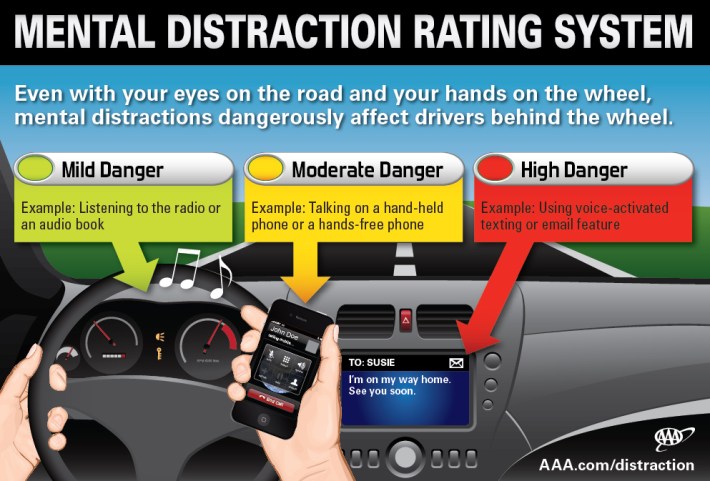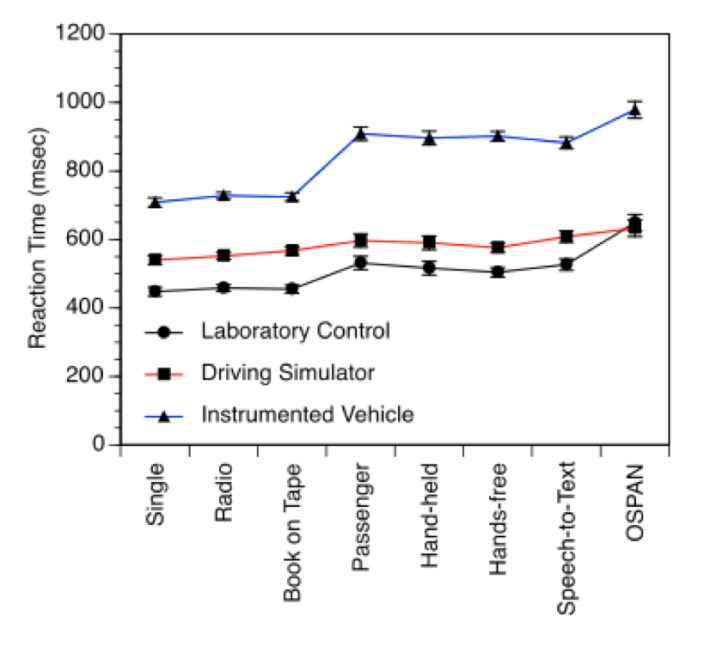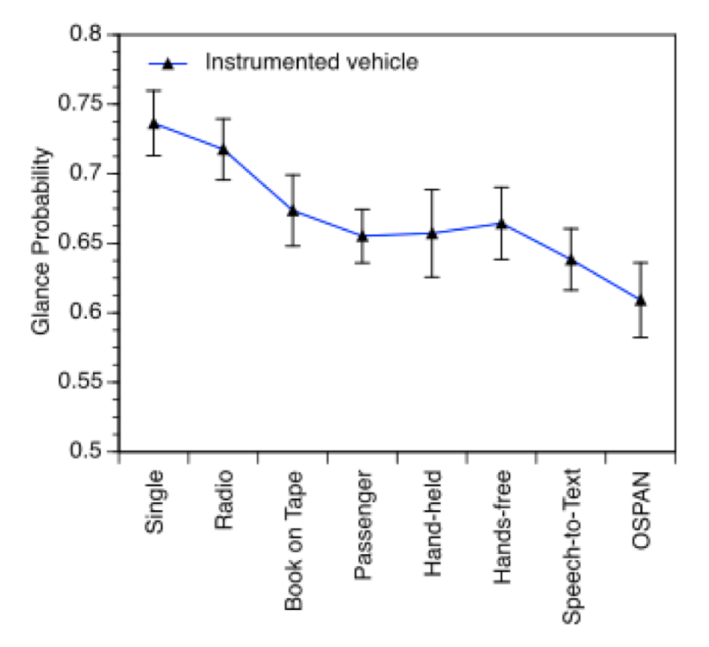
Distracted driving killed 3,331 people on American streets in 2011, yet car manufacturers continue to outdo each other to add more infotainment distractions in their vehicles. These systems are expected to increase five-fold by 2018, according to AAA. Carmakers seek to show their commitment to safety by making their distractions – onboard dinner reservation apps and social media, for example – hands-free. But a growing body of research indicates that there is no safe way to combine driving with tasks like dictating email or text messages.
AAA recently teamed up with experts at the University of Utah to conduct the most in-depth analysis to date of the impact of cognitive distractions on drivers’ performance. They found that some hands-free technologies, like voice-to-text email, can be far more dangerous than even handheld phone conversations. Unlike previous studies, they also found that conversations with passengers can be more distracting than those on the phone, but only if the passenger is kept unaware of what's happening on the road.
The researchers had subjects first perform a series of eight tasks, ranging from nothing at all to usage of various electronic devices to something called OSPAN, or operation span, which sets the maximum demand the average adult brain can handle. For the OSPAN, the researchers gave subjects words and math problems to recall later, in the same order, as a way to “anchor the high end of the cognitive distraction scale developed by the research team,” according to AAA’s Jake Nelson.

The subjects then performed these eight tasks while operating a driving simulator, and then while driving on residential streets in an “instrumented” vehicle that captures information about the driver’s eye movements and brain activity.
In each environment, researchers studied how the additional tasks added to subjects' “cognitive workload” and diminished their eye movements. They found that as drivers devote more mental energy to other tasks in addition to driving, the less observant they become, and the more they fail to scan for roadway hazards.
This bolsters the conclusions of previous experiments: that when drivers are mentally distracted by some other task, they get tunnel vision. They keep their eyes fixed on the road in front of them to the exclusion of everything else -- the rear-view mirror, side mirrors, and “safety critical roadside objects” and “cross traffic threats” -- such as pedestrians.
The AAA study also found that greater “cognitive workloads" slow drivers' reactions to events like a ball rolling in front of the car and a kid running out to catch it. (Reaction times were measured with the simulator, not the instrumented vehicle driving on real streets.)
The researchers conclude that hands-free communications can be significantly more distracting and dangerous for drivers to engage in than passive tasks like listening to music:
Some activities, such as listening to the radio or a book on tape, are not very distracting. Other activities, such as conversing with a passenger or talking on a hand-held or hands- free cell phone, are associated with moderate/significant increases in cognitive distraction. Finally, there are in-vehicle activities, such as using a speech-to-text system to send and receive text or e-mail messages, which produced a relatively high level of cognitive distraction. The data suggest that a rush to voice-based interactions in the vehicle may have unintended consequences that adversely affect traffic safety.

The researchers note that of the eight tasks, only one required subjects to take their hands off the wheel (using the handheld phone), and none involved taking their eyes off the road, so the decreased attention and increased reaction times were are all attributable to cognitive distraction – something all the hands-free gizmos in the world can’t fix.
Increased use of these distracting technologies contribute to a “looming public safety crisis,” said AAA President and CEO Robert Darbelnet in a statement.
The study authors say they hope their findings will be used to craft “scientifically-based policies on driver distraction," particularly in relation to cognitive distraction.
AAA’s recommendations include:
- Limiting the use of voice-activated technology to core driving-related activities such as climate control, windshield wipers and cruise control, and ensuring that these applications do not lead to increased safety risk due to mental distraction while the car is moving.
- Disabling certain uses of voice-to-text technologies including social media, e-mail and text messaging, so that they are inoperable while the vehicle is in motion.
- Educating vehicle owners and mobile device users about the responsible use and safety risks of in-vehicle technologies.
AAA has met with safety advocates and provided copies of the report to CEOs of all major U.S. automakers as part of its effort to raise awareness of the safety implications of emerging in-vehicle technologies.





